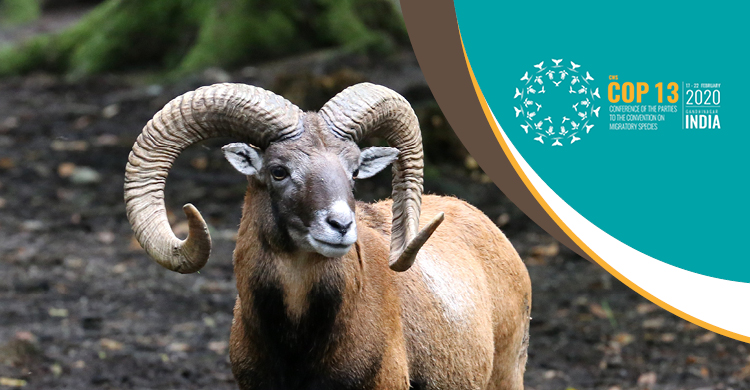Gobi Bear, Persian Leopard and Wild Sheep Set for Greater Protection

The Urial, a wild sheep, should be included under the Central Asian Mammals Initiative (CAMI) © Rufus41
Bonn, 14 February 2020 – The Gobi Bear – the only bear living in the desert - the Persian Leopard and the Urial, a wild sheep, are set to join other Central Asian mammal species already benefiting from international cooperation under CMS.
The Urial is being proposed for listing on Appendix II at CMS COP13, while Range States are seeking to include it as well as the Gobi Bear and Persian Leopard under the Central Asian Mammals Initiative (CAMI).
In many parts of the species’ range, Urial populations are declining, have become fragmented and are prone to local extinction. They face poaching, competition with livestock, degradation of habitat, and human-wildlife conflict due to crop-raiding.
CAMI currently covers 15 species including the Saiga Antelope, the Snow Leopard and the Cheetah. The initiative spans 14 countries from the Russian Federation and Kazakhstan in the west to China in the east.
Central Asia boasts the world’s largest intact grasslands, but the scale of this habitat is being threatened by the rapid construction of roads and railways. Many migratory mammals rely on these large steppe ecosystems and on the region’s deserts and mountains for their survival. Linear barriers to migration, coupled with illegal hunting are putting their survival at risk.
Targeting threats from the construction of linear infrastructure is part of a comprehensive package of conservation measures that CAMI Range States are expected to adopt at COP13 for the period 2021 – 2026. The countries concerned will enhance transboundary cooperation, and enforce national legislation to prevent poaching, possession, and trade.
Geographical information about species and landscapes will be continuously updated in the new Central Asian Mammals Migration and Linear Infrastructure Atlas. It will help decision-makers to plan and implement infrastructure projects to make them wildlife-friendly or, for infrastructure already in place, retrofit them to mitigate or eliminate their barrier effect. The Atlas is an important conservation tool to restore and ensure the connectivity of landscapes and ecosystems.
More research will investigate the feasibility of traditional pastoralism to reduce overgrazing by livestock, which results in human-wildlife conflicts. At the same time, more sustainable agricultural practices would promote carbon sequestration to mitigate the effects of climate change.
Community engagement, good governance and sustainable use of natural resources, capacity development and increasing scientific knowledge are also components of future work.
CAMI coordinates conservation activities, cross-border cooperation and efforts to address major threats to species such as the Saiga Antelope, the Snow Leopard, and the Wild Camel and their habitats.
The Central Asian Mammals Initiative is scheduled for discussion on Tuesday, 18 February.
For more information, please see:
Last updated on 07 Octubre 2020
Type:
News
Species group:
Terrestrial mammals


